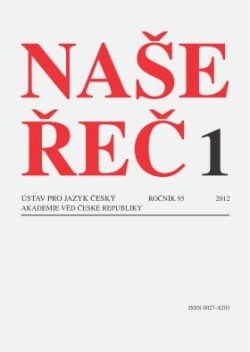Přízvučné a nepřízvučné ten při odkazování k vedlejším přívlastkovým větám
The stressed and unstressed pronoun ten in referring to relative clauses
Author(s): Jan Volín, Magdalena ZíkováSubject(s): Language and Literature Studies
Published by: AV ČR - Akademie věd České republiky - Ústav pro jazyk český
Keywords: context; demonstratives; referring; stress
Summary/Abstract: The study deals with the question of stress-based prominence assigned to the Czech demonstrative pronoun ‘ten’ (meaning roughly ‘this’ or ‘that’ or even ‘the’) in certain contexts. While the default production of the pronoun is unstressed, there are some semantically defined situations in which its stressed form of the pronoun seems more appropriate. The analysis of such situations and a speech production experiment were carried out to form and possibly support hypotheses about the use of the stressed form. The results suggest that natives speakers of Czech possess the sensitivity to differentiate between ‘classifying’ and ‘discerning’ contexts and manifest this relatively consistently in their speech by assigning prosodic salience to the demonstrative pronoun ‘ten’ and by deaccenting the first syllable of the following noun.
Journal: Naše řeč
- Issue Year: 2012
- Issue No: 1
- Page Range: 33-44
- Page Count: 12
- Language: Czech

